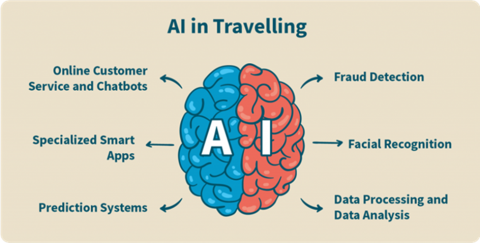
Technology and its applications have continued influencing and disrupting the tourism industry. Destinations can embrace this opportunity to leverage artificial intelligence, the metaverse, virtual reality, and ChatGPT to reimagine what it means to deliver value to customers, develop additional products, and manage people and operations.
A recent report, The Promise of Travel in the Age of AI, released in September 2023 by Skift Research in conjunction with McKinsey and Company, details ways in which digital technologies will challenge tourism businesses to reimagine the way they inspire travel, interact with customers, and manage both people and operations. In the report, they emphasize that the digital transformation of travel is not a fad but rather the norm, and now is the time for innovation. According to industry forecasts, the travel industry will grow an average of 5.8 percent per year by the end of the decade, outpacing the economy's expected growth of 2.7%. Therefore, to meet the growing travel demand, destination organizations must utilize new and emerging technologies such as ChatGPT to deliver value to their customers, reset interaction, and manage people and operations.
While larger organizations may have dedicated resources for investing in these technologies and building in-house operations, the industry is advancing rapidly to become accessible to small and large businesses. Recent technologies, including ChatGPT 4.0, Google’s Bard, Clearview AI, and Smart guide AI-powered, help an organization to streamline its processes, find innovative solutions to challenging issues, enhance safety and security with facial recognition, and create personalized recommendations for travelers. However, grasping the full potential of generative AI, understanding its limitations, and effectively capitalizing on it remains a challenge for destination organizations. Further, personalized digital-first experiences have become the norm in the industry for travelers as digital technology has been increasingly ingrained in our daily lives.
There are specific use cases in which destination organizations can employ these technologies to understand better how to interact with their customers and deliver exceptional value. Investment in these technologies offers destinations distinct advantages, including enhanced operational efficiency, improved customer satisfaction, and promotion of sustainable tourism that close the gap between the promise and reality of travel. The age of AI has also enabled customers to put more information about themselves online than ever, allowing destinations to develop deeper insights into their customers. Because AI is critical to understanding consumer behavior, the industry must understand which data points are the most relevant for their operations.
"With AI, consumers are typing in a lot more information about themselves. Now you have a lot more data—very rich information about the consumer— than you did before.” - The Promise of Travel in the Age of AI
Enhanced Operational Efficiency
Destinations are at the preliminary stages of understanding how artificial intelligence and emerging technologies can enhance business operations. Various use case applications include automating repetitive tasks, reducing human errors, and optimizing data utilization. Through these use cases, destinations can improve customer service by tailoring personalized recommendations, planning itineraries with ChatGPT, and gaining more visitor data. For example, AI-powered systems can handle venue bookings, transportation arrangements, and itinerary planning with precision and accuracy.
Moreover, a scenario in which AI is used for venue selection equips the destination to analyze historical data and participant preferences and understand real-time availability to recommend the most suitable venue for a particular event. This application of AI saves the destination time. It reduces the margin for human error and ensures that the chosen venue aligns with the event’s objectives, whether a corporate meeting or sporting event. To help close the existing workforce gap, Oygvue is an AI platform that allows a destination to move beyond the organization of the workforce based solely on headcount and roles and instead focuses on different elements of the workforce, including work, activities, skills, and competencies.

Improved Decision-Making with Optimized Data
Destinations can create tailored and personalized recommendations based on relevant data using new and emerging technologies. At the forefront of this transition are the applications of chatbots that have been employed on destination websites to gather more insight into traveler preferences. The chatbots aim to be responsive and better understand a traveler's or attendees’ preferences in visiting the destination. Further, AI can create individualized itineraries, suggest activities based on interest, and spread awareness of off-the-beaten-path destinations based on traveler data. Imagine a scenario in which an organization can upsell its destination to a customer who is interested in nature and is planning a road trip to Colorado. In this example, AI suggests exchanging the three nights in a large city for an additional night in the destination instead. Improved customer satisfaction with the application of personalized recommendations helps to foster loyalty, a sense of community, and the likelihood of return visits.
Promotion of Sustainable Tourism
As the tourism industry advances, organizations must manage the destination to promote lesser-known areas while maintaining visitor demand. Guide Geek, a personalized travel assistant, helps to spread awareness of off-the-beaten-path destinations to travelers with data preferences. In this platform, Guide Geek provides traveler recommendations through WhatsApp messaging with new itineraries suggested; this effectively helps move travelers from highly trafficked areas to lesser-known places, helping to ease visitor demand. In this example, AI can be part of a destination-built holistic sustainable tourism plan. Moreover, proper deployment of AI technology can allow a destination to study and predict traveler behavior, offer personalized packages, and help an organization market its tourism assets to the intended audience more quickly. Further, AI can be applied to create a sacred location experience for travelers, reduce carbon footprints, and improve destination operations. Examples of destinations employing this strategy include Machu Picchu in Peru and Tourism Jasper in Alberta, Canada.
New and emerging AI technologies are disrupting the tourism industry. However, there are applications of its use that can be utilized for good in closing the gap on the labor shortage, increasing efficiency in operations, creating curated experiences for the traveler, and moving travelers around a destination to ease capacity limits. Travel is undergoing a digital transformation, but there are endless possibilities regarding how these technologies can solve current challenges, develop innovative solutions, and enhance safety measures for a secure future in tourism.


